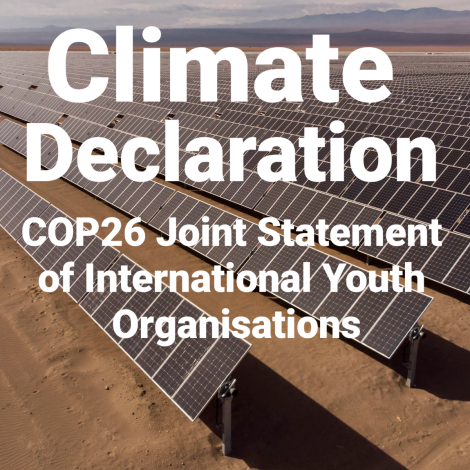Climate change has solutions, and engineers and other technically trained professionals should play key roles in healing the natural environment. Global organizations of young engineers have issued a statement that can be summed up to that effect to the UN climate change conference COP26 in Glasgow, Scotland. The statement recognizes the importance of technological and scientific expertise in deploying solutions, and it has Engineering for Change’s official endorsement.
“Young engineers and scientists have the determination to develop practical solutions that meet the challenge and deliver a sustainable future” – Joint statement to COP26
Signatories include the World Federation of Engineering Organisations Global Young Engineers Working Group on SDG13, UNFCCC YOUNGO, UN MGCY Science-Policy Interface Platform, Global Youth Climate Network (Y2Y Community of the World Bank Group), members of the UN Secretary-General’s Youth Advisory Group on Climate Change and a UN Youth4Climate Pre-COP26 delegate. They are calling for renewed emphasis on climate policy in the world’s governments.
“Climate action and unity is critical to ensuring youth and future generations are able to thrive,” the signatories wrote in a statement. They continue:
“Young people will be disproportionately affected by climate change. Their voice matters – and so does their capacity to drive meaningful change. Young engineers and scientists have the ambition, determination and potential to help develop practical solutions that meet the level of the challenge and deliver a sustainable future. The joint declaration provides a unified voice of highly influential international youth organisations, especially those involving science and engineering, calling the parties of COP26 to deliver ambitious, decisive and timely action in the areas of climate change mitigation, adaptation & resilience, and inclusive and meaningful youth involvement in policy making.”
Engineering for Change has joined 10 global engineering organizations in our official endorsement of the document.
One point in particular deserves emphasis, says Iana Aranda, President of Engineering for Change: 2.3 of the second objective, Inclusive Action.
All COP26 parties to support science, technology, innovation (STI) that include engineering as critical components to informing, advising, implementing, and monitoring impact of evidence-informed policies that contribute to climate action and the 2030 Sustainable Development Goals. Policies must be informed by both short- and long-term assessments of the environmental, social, economic, and ethical impacts of STI, with appropriate consultation of all stakeholders, including youth, women, indigenous peoples and civil society groups. This includes an assessment of climate risks and vulnerabilities of the economic and social well-being of all societies and affected stakeholders within societies.
Please read the joint statement below:

